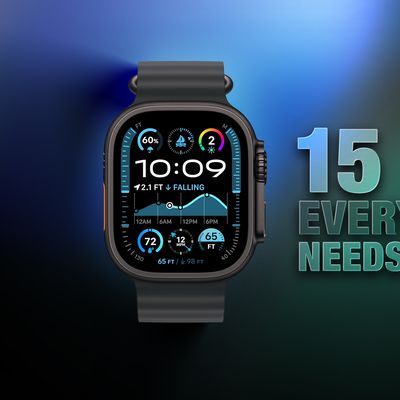
Today marks the tenth birthday of Mac OS X, which officially debuted on March 24th, 2001 as Mac OS X 10.0 with an internal codename of "Cheetah". As noted by Macworld, the release in retrospect was a milestone in Apple's transformation from a struggling computer company into the major technology behemoth it is today.
On March 24, 2001, the iMac was less than three years old, the iPod was still more than six months away, and Macs ran at astounding speeds of up to 733MHz. But most importantly, Apple on that day released the first official version of Mac OS X, changing the future of its platform forever.
Though nobody knew it at the time, the release, codenamed Cheetah, was the first step in transforming Apple from a company poised on the verge of disaster into the second most valuable company in the world.
While the impact of Mac OS X on Apple's products and the user experience they provide is undeniable, the early days of the operating system were anything but perfect, from a shaky public beta released in late 2000 through the public launch of Cheetah that necessitated rapid fixes and improvements that led to the release of Mac OS X 10.1 "Puma" just six months later. As Ars Technica noted in an extensive review of Mac OS X 10.0.0, the release showed "tremendous promise" despite obviously still being a work in progress.
Mac OS X shows tremendous promise, which is a nice way of saying that the 10.0 release is not quite ready for prime time. This is most certainly an early adopter's OS release. Interface responsiveness and effective stability are the two biggest fundamental problems, but missing features and compatibility issues rank just as high if you actually intend to use OS X as a full Mac OS 9 replacement: the 10.0 release cannot view DVD movies; printer drivers are still scarce; CD burning is not yet supported, even by Apple's own iTunes CD authoring application; and a lot of hardware (like my G3/400's serial port adapter to which my printer is attached) seem destined to be orphaned forever.
Mac OS X has obviously come a long way in the ten years since its initial release, but Apple has also become much more than a computer company: revolutionizing music consumption with the iPod, recreating the smartphone market with the iPhone, and most recently finally catapulting the tablet market into consumers' awareness with the iPad. In the process, Apple's operating system for mobile devices, iOS, has itself matured and yielded a number of new innovations and features.
Consequently, Apple has chosen to position the next step in the evolution of Mac OS X as "Back to the Mac", an effort to bring some of the most popular features of iOS to the Mac platform for the first time while retaining the familiarity, flexibility, and horsepower of Mac OS X. That next step, Mac OS X Lion, is set to debut sometime this summer, and developers and users should be able to learn much more about Apple's efforts at the company's Worldwide Developers Conference presumably set to occur in June or July.




















